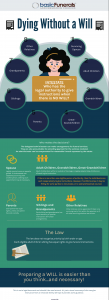Get in Touch
365 Days of Grief Support
Sign up for one year of grief messages designed to offer hope and healing during the difficult first year after a loss
Please wait
Verifying your email address
Please wait
Unsubscribing your email address
You have been unsubscribed
You will no longer receive messages from our email mailing list.
You have been subscribed
Your email address has successfully been added to our mailing list.
Something went wrong
There was an error verifying your email address. Please try again later, or re-subscribe.
Intestate: Dying Without A Will and How it Impacts Funeral Arrangements
I pre-paid my funeral. Do I still need an Executor?
If there isn’t a Will, who can make funeral arrangements?
- Spouse
- Adult Children
- Grandchildren
- Great-Grandchildren
- Parents
- Siblings
- Grandparents
- Other Relatives
Family members can work together when it comes to giving instructions, but if there is conflict, it is best to seek counsel from a professional.
What if I am legally married, but living with someone else?
Being legally married before death to a person of the same or opposite sex, makes the surviving spouse the leading authority on funeral arrangements. In the event of someone still being legally married but living in a conjugal relationship with another person may mean the deceased would be deemed as having more than one spouse. In that case, it could be advisable to seek court appointment or for one of the spouses to renounce their duty.
Does birth order determine priority?
The law does not recognize priority by age. Eligible, appointed adult children, grandchildren, great-grandchildren, or siblings all have equal rights to make funeral arrangements, respectively.
What if parents must make funeral arrangements for a child?
Each parent is equally responsible for making funeral arrangements. If the surviving parents are separated or divorced, but they hold joint custody, they still have equal authority over the child’s arrangements. If one parent held sole custody of the child, then the responsibility belongs to the sole custody parent. If the child is an adult and the divorced parents are in conflict, then legal counsel may be necessary to determine who has the authority to take on the responsibility of making funeral arrangements for the deceased.
I am alone. Do I still need a Will?
It is advisable to prepare a Will and name an Executor if there is not a clear Next of Kin living in the province to look after your affairs. Arrangements can be stalled while awaiting the appointment of an administrator.
Being prepared is a thoughtful act. Learn how to prepare an affordable Will here.
The post Intestate: Dying Without A Will and How it Impacts Funeral Arrangements appeared first on Basic Funerals.


We proudly serve families across most of Ontario, offering accessible cremation and funeral planning by phone and online.
In-person meetings are available by appointment at our conveniently located establishments.
365 Days of Grief Support
Please wait
Verifying your email address
Please wait
Unsubscribing your email address
You have been unsubscribed
You will no longer receive messages from our email mailing list.
You have been subscribed
Your email address has successfully been added to our mailing list.
Something went wrong
There was an error verifying your email address. Please try again later, or re-subscribe.
365 Days of Grief Support
Please wait
Verifying your email address
Please wait
Unsubscribing your email address
You have been unsubscribed
You will no longer receive messages from our email mailing list.
You have been subscribed
Your email address has successfully been added to our mailing list.
Something went wrong
There was an error verifying your email address. Please try again later, or re-subscribe.






